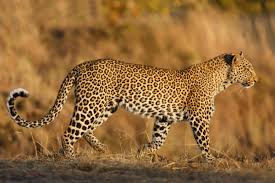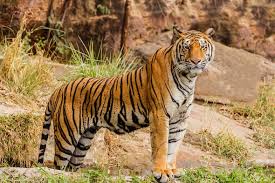The leopard is and will remain, the king of the jungle in Afemailand and Edo, despite the fact that its prowess, reverence and honour have almost been forgotten due to mistranslations and misapplication of its name by Afemai people.

*The leopard (ekpe) is native to Africa
By Prince Muhammad Fawaz
In Auchi kingdom and most other Afemai counterparts, the name “ekpe” which is leopard is often misapplied to the tiger. The etymology of that word is in the Edoid language where it is pronounced and written as “ekpen” and it translates to “leopard”. Many of those who join the bandwagon to call the tiger “ekpe” fail to realize that the tiger is not indigenous to Africa, the tiger’s habitat is Eurasia while the king of the African forest is the leopard.
Both cats have lots of differences which include leopard’s skin having a yellowish-brown or gold coat with densely packed black spots (rosettes) and the tiger’s skin having an orange coat with black stripes. The tiger doesn’t appear as a totemic animal in African folklore because it is alien to Africa. The Leopard appears in arts and crafts more than anywhere else and it depicts various ideals among which are nobility, courage, ferocity etc. Leopards are found in the sculptures and plaques that were looted from Benin during the punitive expedition led by the British in 1897.
Leopardskin patterns have been used in adorning the regalia of Kings and men of high social status for centuries, and many monarchs in Edo state use the title “?kp?/?kp?n”. A famous example is the Oba of Benin who is metaphorically referred to as “Ekpe N’owa” which translates to “home leopard” and when the Oba is deceased, it is said that “the leopard has returned to its lair”. The leopard is the king of the forest and the Oba is the king of the home (Benin). It was also traditional for hunters who killed leopards to give the skin to the Oba, and failure to do that was an act of rebellion.
It was mandatory that leopards killed within the Oba’s domain had to be taken to the palace in Benin. It was of utmost importance for the hunter to cover the head of the leopard immediately once killed so that the eyes would not be seen; this tradition acknowledges the popular maxim “Aimien aro ekpen” which translates to “you can not look the leopard in the eye.” To look into the eyes of the leopard was like looking into the eyes of the Oba, and this was forbidden in Edo culture. When a leopard was killed by a hunter, an “inquest” was held at the palace of the Oba. The inquest leader asked the killer “What leopard did you kill?” this question was asked seven times and the proper answer was, “Í gbe ekpen n’oha , Í ma gbe n’owa” which means “I killed a bush leopard and not a home leopard”. The understanding is that the home leopard is the Oba. A mistake in answering this sensitive question could cost the killer his life in the past. If he made no mistakes in his answer, the Oba honoured the hunter and the leopard was turned over to the palace and every part of the leopard-like the skin, teeth, blood etc were used by specialists assigned by the Oba for symbolic, medicinal and spiritual purposes.
The people of Afemai migrated during the reign of Oba Ewuare in the 1400s; they continued paying tributes of leopard skins to the Oba of Benin and the killer had to go to Benin to deliver it in person. This journey from Afemai to Benin took months or even years for the hunter. Some delayed due to contingencies and others died en route. To give the leopard’s killer the benefit of doubt, the people waited for a period of three years during which all his rights and privileges were withdrawn at the expiration of this period; his wives, land, etc could be given out to other people. This experience gave birth to the following clichéd proverbial sayings amongst the Afemai:
- Ọgb`ẹkpẹ lọ ghiẹ ẹgbọ li úso vbẹ Ẹdo (The Leopard killer sends himself on a journey to Ẹdo).
- Aró amhi khẹ ọno yẹ Ẹdo (They don’t keep a wife for one who went to Ẹdo).
- Ikpẹ éla l`akhẹ ọno yẹ Ẹdo (It’s three years of waiting for one who went to Ẹdo).
In Auchi oral tradition, Uchi, was the man who founded the Auchi Kingdom, after migrating from Udo, a settlement located about 24km North-West of Benin (circa the 1400s) during the reign of Oba Ewuare. According to some historical oral tradition, Udo was the original home of the Ogiso and later became subject of Benin’s most violent rivalry for the centuries that followed due to their resistance to Benin hegemony. Uchi migrated from Udo with five sons to the present location of Auchi. Ogun, who happened to be his first son, is a name which has its roots in the Edoid language and is the original name of Oba Ewuare who ruled the Benin empire from 1440 to 1473, a period characterised by mass migrations of which the Afemai were part. His second son was called “ekpe” which translates to leopard and whose descendants are called “Afe-ekpe” which translates to “family of the leopard” and they later became dreaded warriors and blacksmiths among the Uchi scions. Most Afe-ekpe descendants are not spared from this misconstruction of their totemic animal which is the leopard and not the tiger.

*A tiger is a Euro-Asia native and not a native in Africa
There is a proverb amongst the Auchi people that “Ẹkpẹ lhọ vbi Ẹkpẹ”, meaning “leopard begets leopard”. Our ancestors can not be leopards and we become tigers, it is impossible. In Auchi folklore, there are stories of Kings and great men who metamorphosed into the leopard. Examples include the Idaeo princes and the most famous amongst them was Chief Kadiri Idaeo who was said to have transformed into a leopard at will and especially when he was provoked. The leopard is even more venerated among other African ethnic groups than any other animal. Examples are the Borgu, Ibo, Yoruba, Zulu, Swazis, etc.
Prince Okpam? who, according to the Ora people of Owan in Afemai, was their founding father and who later became Oba Ozolua of Benin, also killed a leopard and till date, there is a statue of him in the middle of the town dragging a dead leopard which was terrorising the inhabitants of that town. It is said that he was roasting this leopard when his wife went into labour and gave birth. This prompted him to name the child “Ora ekpen” which translates to “firewood used in roasting a leopard”. The people of Ora still use the word ekpen as a title to sum up nobility, courage, royalty, strength etc.
For centuries, the word “ekpe” has been used in praising monarchs, great hunters, etc throughout Afemailand but has often been mistranslated and misapplied to the tiger. The tiger is not indigenous to Africa and its reverence in African society today was introduced by the Europeans since the colonial era through writers, movies, etc. Tigers are not found in the wild except in captivity throughout the African continent. The Afemai people, however, have a word for lion which is “Oduma” because it is indigenous to Africa and roams the savannas, but the leopard is more revered than the lion in Edo and its environs because the leopard and the people are both indigenous to the forest while the lion’s habitat is the savanna grasslands.
The leopard is and will remain, the king of the jungle in Afemailand and Edo, despite the fact that its prowess, reverence and honour have almost been forgotten due to mistranslations and misapplication of its name by Afemai people.
There are other proverbs about the leopard in Afemailand:
- Ẹkpẹ ọdo tse (The Leopard does not buy beauty)
- Ẹkpẹ lhọ vbi Ẹkpẹ (Leopard begets leopard)
- Ivbi Ẹkpẹ le yẹn Ẹkpẹ éʼnié (It is the leopard’s cubs that sucks her breasts)
- Ọrhẹ khẹ Ẹkpẹ khia ẹlami lhọ lé, Ọrhẹ khẹ awa khia itsọ lhọ lé (The companion of the leopard eats meat, while the companion of a dog eats excrement)
- Tsa vba miè ọ li úsé, ọ rha tsʼẹkpẹ (If they do not take the bow from him, he will shoot a leopard)
- A vba mhọ mhẹ lo Ẹkpẹ ọgbʼẹghue yọ (“I do not have an owner” made the leopard killed the goat)
- Ẹkpẹ ọ miẹ ariè vbʼégbé (The leopard loathes blood on itself)
- Ẹkpẹ ọ’gbi khia (the leopard does not hunt flies)
- Tséni ovbi Ẹkpẹ ọ vba rhʼutsé khʼẹkpẹ ọ rhʼofia égbé khọ li (if the leopard cub does not resemble it with its roar, it would with its skin)
Prince Muhammad Fawaz sent in this work via apexprince1@yahoo.com
All correspondences, typed and double-spaced should be sent to the Editor, at pegasusreporters@gmail.com. Follow us: @pegasusreport on Twitter and Facebook The Pegasus Report. Join our mailing list on Telegram (+234 8133088344) and WhatsApp (+234 8154445334).
- READ ALSO: Features: VaDoma: The Zimbabwean Ostrich Tribe With Rare ‘two-toed’ Population
- METRO-CULTURE: Eyo Festival, Things You Should Know About the Celebration
- ‘The Igbo Landing’ The Heroic Story of Igbo Slaves Who Committed Mass Suicide Off U.S. Coast In 1803
- Why the Himba People in Namibia Don’t Take Baths – By Chidirim Ndeche
 Pegasus Reporters Issues on the Wing
Pegasus Reporters Issues on the Wing

